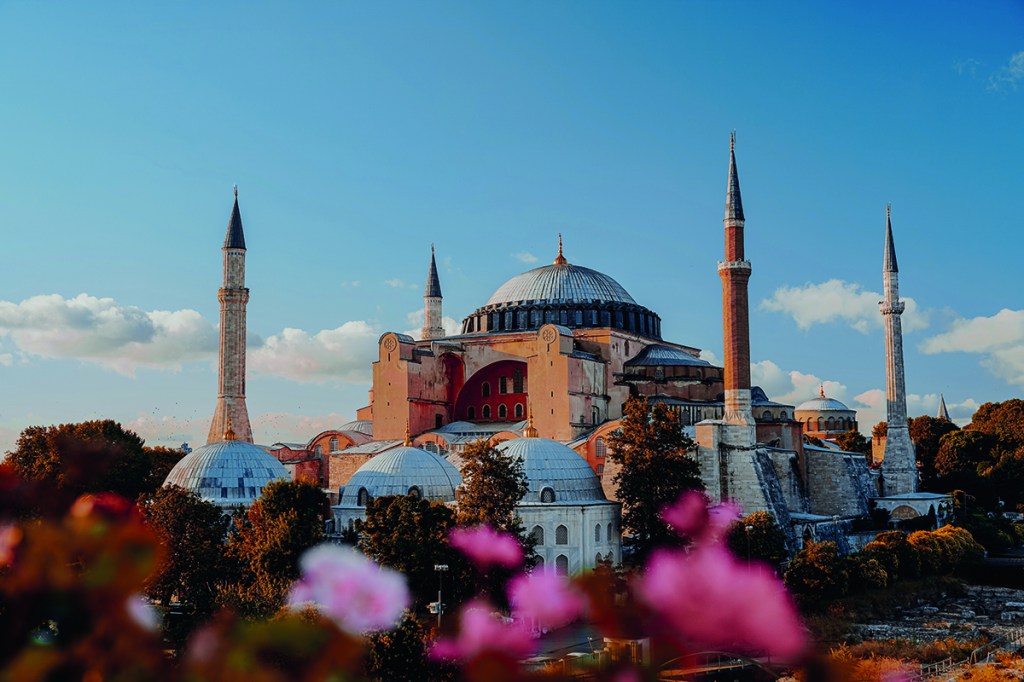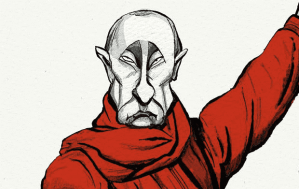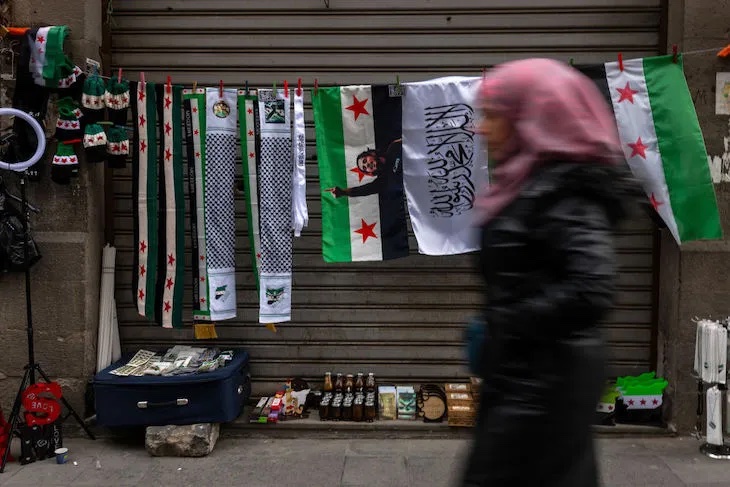I decided to walk from Athens to Byzantium — Constantinople, the medieval Queen of Cities, lately Istanbul. I had a little red tent and a vision of noble penury that evoked the ghosts of Cyriaco of Ancona (d. 1452) and Paddy Leigh Fermor (d. 2011). My girlfriend said she’d join me later.
The lines that now smudge my map look more like the flight of a woozy bluebottle than the traces of a man with a plan. My earliest memories of the trek are melancholy. Plodding through the suburban sprawl of Athens with two dozen books on my back, my mood soured at the necessity of following major roads, inhaling fumes, encountering packs of stray dogs and having to pitch my little red tent far enough from society to avoid people telling me to bugger off, while staying close enough to it to be able to buy water. At night I erected my lonely home on cold ground, feeling more like an orphan than a paragon of romantic brio. A footloose detour through the touristy island of Aegina left me feeling more listless than intrepid.
Fortunately, madness saved the day. In Euboea I tapped its rich, sticky vein, like chiseling resin from a tree. Perhaps ‘madness’ is facetious. Really it was the supreme confidence that God was bothering to guide me. Maybe I can rationalize the euphoria in hindsight. I am an islander — a Scillonian, from the tiny Scilly Isles, 28 miles off the tip of Cornwall — and the sea bestows a sense of security. Perhaps I was simply a landlocked seadog rejoicing in the return of the waves.
At the northeast tip of Euboea I settled down into the simple pleasures of beer, sun and books. Picking up the rhythms of village life, from the chirring cicadas to imitating the elderly who plunged into the chilly sea as the sun reared its brassy head, I anchored myself by deciphering church frescos or observing life in the plateia (the village square).
The divine and mundane danced hand in hand. One morning I woke in a glade surrounded by haphazard chimes. Darting everywhere to find their source, I’d woken in Pan’s lair or gone insane. After an eon a tribe of goats, adorned with clanging bells that made them sound like emissaries of some netherworld, and their leathery shepherd, passed.
Walking Euboea’s coast on those enchanted days, my mind dived into the vigor and light of Arcadia. The paintings of John Craxton (d. 2009) gradually made sense. He’d illustrated most of Leigh Fermor’s book jackets in a manner I’d once found childish. As I ambled along, however, I saw how the bombastic Mediterranean palette had shaped his Blakean visions into Cubist postures.
My extracurricular (non-Byzantine) reading was Thomas Pangle’s introduction to Leo Strauss, some of Camus’s work and a book on ancient vase painting. I was bemusedly reading that nothing was left of Polygnotos, supposedly Antiquity’s greatest painter, when some cheery locals co-opted me into their baby’s baptism, an event that managed to offend my dull Anglican sensibilities. Emerging from the church’s cool womb, I fell back into scrumping figs and reading, but foul tempers overtook me: Protestantism’s condescension toward its theological parents and an English distrust of Mediterranean peoples as lax, slack and fiery.
Time has distilled my memories of the islands Alonissos, Skopelos and Skiathos into single frames. A taverna here, an emotion there. It’s all washed away by a dawn voyage back to Volos on the mainland: a stilled world of silhouettes — a scene of gunpowder grays — stirred into life by a circus of light and shade, like a peacock shrugging off sleep.
What followed were a series of sweaty, sun-baked marches (averaging 15 miles a day) sprinkled with reading. Basiliscus’s failed attempt on Carthage (468 ad), the Slavic deluge and the nadir of Thessalonica’s siege (676-78 ad) swirled in my head. This was European history at its most forlorn and forgotten. As the history became more volatile, I found solace in the modern Greek literature of Kazantzakis, Elytis, Ritsos, Gatsos and Seferis. But as I hiked the coastline between Mounts Ossa and Olympus, my water supplies drained to nil.
I’d never been dehydrated before. Struggling to remain captain of my own cockpit, I swooned before sputtering images and mirages as if in flu’s delirium. After miles of solitude, despair set in. Nothing was funny, but I took refuge in laughter. What a silly little man I was, exactly the sort I’d deplore. I’d die like this, not shrouded in mystery, glamour or Byronic heroism, but a relic of absurdity. I’d perish a mile from an ice-cream stand.
As my humor grew darker, two topless women playing volleyball hove into view. I dismissed them as fantasies, yet they remained material. Though they had no mineral water we frolicked in the sea, sunbathed, ate and so on. When I later grew insistent (dying for the sake of politeness was a Rubicon I was not prepared to cross), Rita and Anastasia took their vintage Mini behind the dunes to an uncle’s yogurt factory. After I’d downed two pints of water, they beckoned me into a vat of yogurt. We drank ouzo until our speech slurred and a worker hosed us down.
The main highlight of the beach town of Paralia Katerinis (on the west coast of the Thermaic Gulf) was camping in a derelict bar where I was threatened with death-notes by gypsies who drummed their message home by defecating en masse around my tent. The messages were signed by an indignant ‘admiral’ for extra authority. For two weeks I slept in this noxious fortress under siege from the naval high command.
Those days were peppered with discoveries large and small. Washing the few clothes I had in the sea turned them into cardboard. Explaining Spengler’s Decline of the West to Katya, a Polish lass who had approached me on the beach, ensured a romance would remain chaste. Praying on St Paraskevi’s marble floor (initially to escape the heat) I learned how to assimilate into piety by kissing icons, genuflecting and dissolving into the chants and incense.
Outside church I cultivated the lofty but insolvent air of a scholar-tramp. Only prodigious amounts of alcohol could puncture this self-image. One night I refused to wear shoes at a club and woke the next day with trotters swollen like beets, thanks to the tiny shards of glass they’d collected. I spent an inordinate amount of time at the doctor.
After a fierce reunion with my girlfriend, I walked to Chalkidiki’s second peninsula via the monasteries. My fear of the ostentation, darkness and bejeweled nature of the Orthodox faith had faded. I grew to adore the older icons with their calamitous intensity, as if marinated in all the hopes and fears hurled at them, their slight air of secret and embittered worship and the preternatural feeling that God had a hand in this material intercessor.
Following another couple’s lead, we camped as nudists on our own stretch of sand. Gradually we felt drawn into a new beginning, an Eden that consisted almost solely of sex, wine and sun. What was once ordinary had become precious. At the heart of this revelation lay the fact that impermanence didn’t drain moments of their meaning; it charged them with an excess of it. Nothing could be taken for granted. Everything had to be drunk, and drunk deep with thanksgiving.
At Constantinople, the imperial city, emotions broke over me like Atlantic rollers. From the Theodosian walls to Constantine’s column, I grew ecstatic treading where the Romans had remained steadfast until the Ottoman conquest of 1453. This reached fever pitch at Hagia Sophia, where any admiration of the details was swamped, subsumed by the profound understanding that God still lingered in the gravity of its marbles.
There was a logic to the rest of the trip: Ephesus in Turkey for the ruins; island-hopping back to the Greek mainland through Chios, Lesbos, Limnos and Samothraki for waterfalls, hot springs, castles and eccentric wines; and Alexandroupoli for the ruins of Traianoupoli. My richest memories are gone now, smudged to oblivion by the lilacs of dusk, which followed the sun after it had melted like honey or been squished like an overripe apricot. Not just the world, but the people were transmuted daily, glowing with the sun’s light just as the stones surrendered its heat.
Henry Hopwood-Phillips is a travel writer and historian living in London. His work can be found on byzantineambassador.com This article was originally published in The Spectator’s August 2021 World edition.

























